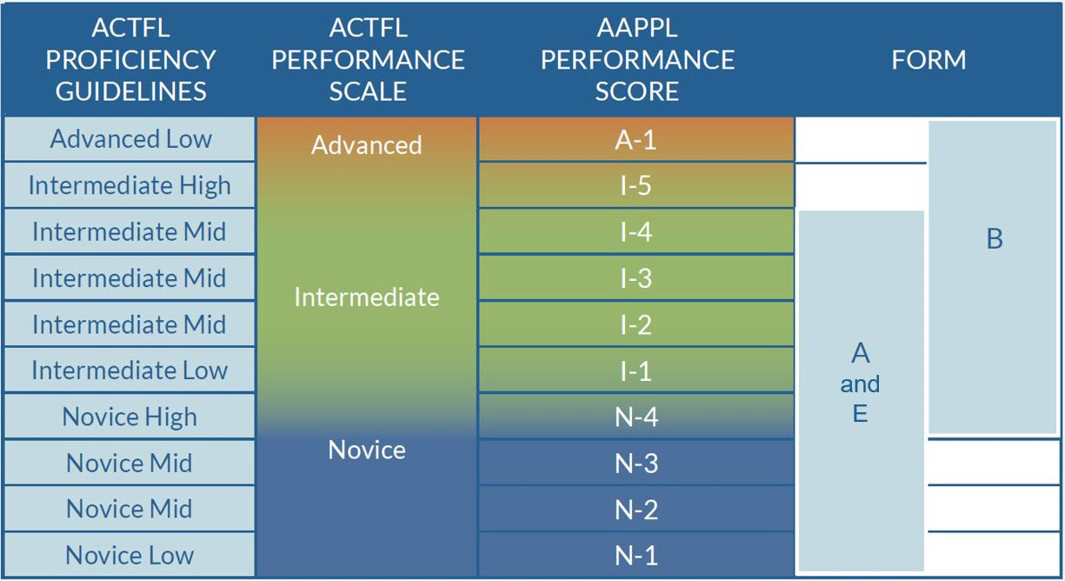
Have you found yourself asking any of these common questions pertaining to the AAPPL?
AAPPLに関連した、よくある質問のどれかに気がつきましたか?
How can I prepare my students for the AAPPL?
AAPPLのために生徒をどのように準備したらよいでしょうか?
Is the AAPPL a performance test or a proficiency test?
AAPPLはパフォーマンステストですか、それとも言語運用能力テストですか?
How do I prepare my students for the AAPPL if there aren’t set topics to learn?
学習するトピックが決まっていない場合、どのように生徒にAAPPLの準備をさせたらよいでしょうか?
The underlying motivation of these questions we often hear from educators is a desire to guide learners through a successful testing experience and to help them to demonstrate their maximum potential in the language. Knowing that proficiency is more than a set of vocabulary terms or grammar rules to know inside and out, let’s start by looking at how performance and proficiency are part of the AAPPL.
教育関係者からよく聞かれるこれらの質問の根底にあるのは、学習者をテストの成功に導きたい、語学の潜在能力を最大限に発揮できるようにしたいという願いです。言語運用能力とは、単に語彙や文法規則を熟知しているだけではないことを理解した上で、AAPPLにおいてパフォーマンスと習熟度がどのように関わっているかを見ていきましょう。
What does Performance toward Proficiency mean?(言語運用能力に向かうパフォーマンスとはどういう意味ですか?)
The ACTFL Assessment of Performance toward Proficiency in Languages (AAPPL) is sometimes mistakenly identified as a performance test, yet the AAPPL is an assessment that was purposefully designed with both proficiency and performance in mind. The ACTFL Performance Descriptors for Language Learners define proficiency and performance as follows.
ACTFL Assessment of Performance toward Proficiency in Languages (AAPPL)は、パフォーマンステストと誤解されることがありますが、AAPPLは言語運用能力とパフォーマンスの両方を念頭に置いて意図的に設計された評価です。ACTFL Performance Descriptors for Language Learners(言語運用能力に関するACTFLの規定)では、言語運用能力とパフォーマンスを次のように定義しています。
“Proficiency is the ability to use language in real world situations in a spontaneous interaction and non-rehearsed context and in a manner acceptable and appropriate to native speakers of the language. Proficiency demonstrates what a language user is able to do regardless of where, when, or how the language was acquired (p.4).”
「言語運用能力とは、実社会の状況において、自然発生的な相互作用や非リハーサル的な文脈の中で、その言語を母国語とする人々に受け入れられ、適切な方法で言語を使用する能力のことです。言語運用能力とは、その言語がいつ、どこで、どのように習得されたかに関係なく、その言語使用者が何をできるかを示すものです(p.4)」
“Performance is the ability to use language that has been learned and practiced in an instructional setting. Coached by an instructor, whether in a classroom or online, or guided by instructional materials, performance refers to language ability that has been practiced and is within familiar contexts and content areas (p.4).”
「パフォーマンスとは、指導の場で学習し練習した言語を使う能力のことです。教室であれ、オンラインであれ、指導者によって指導され、あるいは教材によって指導されるパフォーマンスとは、慣れ親しんだ文脈や内容領域の中で練習された言語能力を指します。(p.4)」
Notice how AAPPL scoring is aligned to both the ACTFL Proficiency Guidelines-2012 and the ACTFL Performance Scale (see image below). The three links below also lead to tables that contain the full range of scores for each section of AAPPL. These comprehensive sets of score descriptions and strategies may be helpful in establishing curriculum goals and strategies.
AAPPLの採点が、ACTFLの言語運用能力ガイドライン-2012とACTFLのパフォーマンス・スケールの両方に準拠していることにご注目ください(下の画像を参照)。以下の3つのリンクは、AAPPLの各セクションの全得点範囲を含む表にもつながっています。これらの包括的なスコアの説明とストラテジーは、カリキュラムの目標とストラテジーを設定する際に役立ちます。
・Interpersonal Listening & Speaking(対人関係のリスニングとスピーキング)
・Interpretive Listening and Reading(解釈的リスニングとリーディング)
・Presentational Writing(プレゼンテーション・ライティング)

“AAPPL is . . . ideal for language learners who will transition from using the language in planned, rehearsed classroom settings (performance) to using it spontaneously in completely novel settings (proficiency); the AAPPL combines the two approaches to focus attention on both what students have learned to do and what they can do in new settings” (https://www.actfl.org/resources/press-releases/actfl-releases-topics-aappl-assessment). The AAPPL is intended to encourage a washback effect into the classroom that motivates educators to take an overall proficiency-based approach.
「AAPPLは、……計画され、リハーサルされた教室での言語使用(パフォーマンス)から、まったく新しい環境での自発的な言語運用能力へと移行する言語学習者にとって理想的なアセスメントです。AAPPLは、2つのアプローチを組み合わせることで、生徒ができるようになったことと、新しい環境でできるようになったことの両方に注意を向けます」(https://www.actfl.org/resources/press-releases/actfl-releases-topics-aappl-assessment)。 AAPPLは、教育者に全体的な言語運用能力ベースのアプローチをとるよう動機づける、教室への波及効果を促すことを意図しています。」
Preparing Learners for Proficiency-based Testing(言語運用能力ベースのテストに向けた学習者の準備)
Returning to the initial questions, how can we guide learners to success on a and proficiency-focused test? With AAPPL, certainly reviewing the AAPPL content and topics can help you have an idea of what to expect.
最初の質問に戻りますが、言語運用能力に焦点を当てたテストで学習者を成功に導くにはどうすればよいでしょうか。AAPPLでは、AAPPLの内容とトピックを確認することで、何を期待すればよいかを知ることができます。
But let’s look at preparation from a different angle for a moment. Think of performance like a piano student learning to play a song for a recital. They learn the notes of the keyboard, how to read music, and practice their piece many times, maybe even memorizing it in preparation for the performance. The student will review and look at that particular piece of music many, many times as they work on timing, accuracy, dynamics, and musicality in the way they play the song. Their performance of the piece is tied to the curriculum/lessons and practice they have done specifically to prepare themselves to perform that piece of music.
しかし、ちょっと違う角度から準備を見てみましょう。パフォーマンスについてはピアノの生徒が発表会のために曲を弾けるようになるようなものだと考えてみましょう。鍵盤の音符を覚え、楽譜の読み方を学び、何度も練習し、本番に備えて暗譜もします。タイミング、正確さ、強弱のつけ方、演奏の音楽性などに取り組みながら、生徒は何度も何度もその特定の曲を見直し、見ていきます。その曲の演奏は、その曲を演奏するために特別に準備したカリキュラムやレッスン、練習と結びついています。
Now, let’s think of proficiency like looking at a piece of music for the first time and being able to read the time signature, identify what key the song is in, and perhaps even sight read the piece. Regardless of what the piece of music is, the student with a certain level of music proficiency will be able to spontaneously apply their knowledge. Certainly, the knowledge and practice that leads to a good performance is also foundational to the development of proficiency. As with music, in testing it is possible to master specific aspects of language performance that help build toward proficiency. But a proficiency test is not a recital performance. In other words, we can best help learners prepare by teaching skills that build proficiency and prepare them to use the language in unscripted ways.
ここで言語運用能力とは、初めて楽譜を見て、拍子を読み、その曲が何調であるかを特定し、おそらくはその曲を視読することができるようなものだと考えてみましょう。楽曲が何であろうと、一定レベルの言語運用能力を持つ生徒は、その知識を自発的に応用することができます。確かに、良い演奏につながる知識と練習も、習熟度を高めるための基礎となります。音楽と同様、テストにおいても、言語パフォーマンスの特定の側面を習得して、言語運用能力を高めることができます。しかし、言語運用能力テストは同じ曲を繰り返して練習した結果のリサイタルではありません。言い換えれば、習熟度を高めるスキルを教え、台本にない方法で言語を使う準備をさせることで、学習者の準備を最も効果的に手助けすることができるのです。




